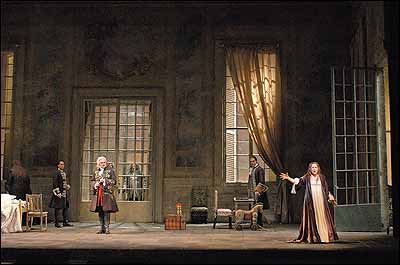
Photo Credit: Marty Sohl/Courtesy of the Metropolitan Opera
Looking for a handsomely appointed, impeccably maintained, ready-to-occupy eighteenth-century villa near Milan? If so, you’re in luck: The perfect property is on view at the Metropolitan Opera. Thomas Lynch’s set for the new production of Handel’s Rodelinda is one of those down-to-the-last-detail, drop-dead-gorgeous, ultrarealistic designs so beloved by Met audiences, and it almost steals the show. Slowly the palatial estate’s wonders pass before our eyes: the elegant reception hall, the well-stocked library, the attractive vine-covered courtyard stables and walls, the manicured gardens. At one point, the whole building rises to give us a glimpse of the more sinister quarters in the basement, which serves as a dungeon for our hero, Bertarido, king of Milan, unjustly deposed by the villainous Grimoaldo. Yes, the place is a knockout.
Of course, the manor is occupied at the moment and by an A-list group from today’s apparently endless store of superb Handel singers. They may be in residence for a while yet, since Rodelinda, now reaching the Met stage for the first time, is among the composer’s greatest operatic achievements, his third masterpiece during the one-year period of 1724–25 (the other two are Giulio Cesare and Tamerlano). The central theme could not be more timely, a celebration of marital fidelity and family values that involves six characters who meet every adversity in a succession of glorious arias that cover an enormous range of emotional heat and nuance. In Rodelinda herself, Handel has created one of his most affecting, musically radiant heroines, a woman whose devotion and sense of responsibility give her an ability to reach out and change the lives of not only her wronged husband and child but everyone around her.
Stephen Wadsworth has updated the original story by about a thousand years to bring it into Handel’s time, a familiar conceit among opera directors these days but in this case one that enhances the Enlightenment tone of the piece and further warms its humanistic message. Otherwise, there is nothing at all indulgent about Wadsworth’s approach. He clearly wants us to care about these people as the composer did, and there isn’t a moment that a character fails to come to life, even the nonsinging role of the perky young son of Rodelinda and Bertarido, Flavio (who grows up to be the title character of yet another historical Handel opera). And the three plotters—the usurper Grimoaldo; his betrothed, Eduige; and his evil genius, Garibaldo—are more than what they seem, especially the repentant Grimoaldo, whose villainy eventually drives him mad.
Rodelinda is sometimes mistaken for a soprano vehicle and presented as such, but fortunately not here. Although she does have eight arias that explore her full character, Rodelinda is really just one member of this ensemble chamber drama, and in that respect, Renée Fleming’s demure portrait fits right in. I just wish this much-loved soprano would go easier on the slurpy portamento effects, focus her voice more squarely on the note, and stop equating cloudy tone with profound expression, but her fans, and even some critics who should know better, seem to adore these irritating mannerisms.The countertenors are superb. Spinning out gorgeous lyrical lines at half-voice and setting off coloratura fireworks are among David Daniels’s specialties, and Bertarido seems to have been composed especially for him. No less accomplished and even more of an engaging stage animal, Bejun Mehta makes much of Bertarido’s counselor Unulfo, a role that’s occasionally deleted but here is made an essential part of the family circle as he plays doting uncle to little Flavio, delightfully mimed by Zachary Vail Elkind. There are no weak links as mezzo Stephanie Blythe (Eduige), tenor Kobie van Rensburg (Grimoaldo), and bass John Relyea (Garibaldo) string one vocal pearl after another and move about the stage with grace. The Met Orchestra has been augmented with a few period instruments, and Harry Bicket, surely today’s Handel-opera conductor of preference, leads a performance that is both alert and dramatically quick. Now that this glorious opera has finally made it to the Met, it is likely here to stay. The present cast is choice, but in these golden days for Baroque opera, there are dozens of Handel singers out there just as distinguished.

With the Messiah ringing out from concert halls all over town, the Met has chosen an opportune moment to stage Rodelinda, its first-ever original production of a Handel opera and just the fourth Handel work it’s ever done. (The first, Rinaldo, starring Marilyn Horne, arrived just twenty years ago.) Why so few? Prevailing wisdom formerly held that the 4,000-seat opera house would overwhelm Baroque aesthetics. But that idea’s been discarded in favor of embracing what the Met does best—grand, lush productions, source material be damned.
Rodelinda
Directed by Stephen Wadsworth.
Metropolitan Opera. Through January 6.